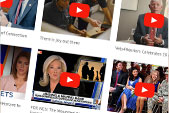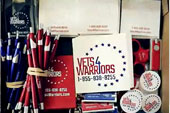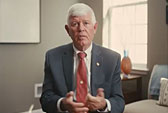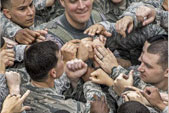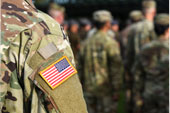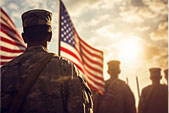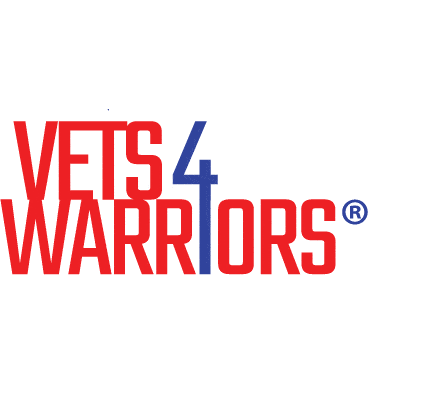Retired Army Maj. Gen. Mark Graham, Executive Director of Vets4Warriors, sits down for an interview with Military Matters to discuss the V4W program.
Vets4Warriors program at Rutgers offers peer-to-peer support for those struggling
For retired U.S. Army Maj. Gen. Mark Graham, the fight against mental health issues and suicide in the military is personal.
Graham, who served 35 years, lost two sons in service to the nation — one was killed in action in Iraq and a second died by suicide while in ROTC training to become an army doctor.
Graham, who retired from military service in 2012, became the commander of a new army a year later. He now is the executive director of Vets4Warriors, a nonprofit housed at the Rutgers University Behavioral Health Care National Call Center located on the Piscataway campus.
Founded in 2011, Vets4Warriors is a peer-to-peer support network that provides immediate help for military veterans struggling with mental health issues.
Vets4Warriors operates completely independent of the military or the Veterans Administration, so it can assure the confidentiality of those who call.
Graham agreed to a discussion on the Vets4Warriors program with Military Matters.
Military Matters: Tell us about the Vets4Warriors program.
Mark Graham: We are a national organization working in the Rutgers Behavioral Health Care National Call Center. We provide support to the entire military community, including active-duty members, National Guard and Reserves, veterans, their family members and caregivers.
Vets4Warriors continues to grow each year. We have had 845,000 contacts since we started and 85,000 last year. We average 24 new individuals reaching out to us every day.
MM: Who takes the calls at Vets4Warriors?
MG: The person taking the call is a veteran, so it is veteran talking to veteran.
We answer calls within 30 seconds and take calls 24/7. The call is confidential. We don’t share any call information with an employer or with the military.
We hire veterans and we train them. It is important to give these veterans jobs. About 70% of them are combat veterans, which helps, because they have gone through the same things our callers call about. A lot of them are New Jersey veterans.
MM: How do you handle such a volume of calls?
MG: We have a full-time staff and a per-diem staff. We also have licensed clinicians. Our licensed clinicians do the training of the peer counselors, and they review cases with them. We do not provide direct care.
Also, we are very collaborative. We share our call lines with RWJBarnabas Health, and we share our information with Rutgers Behavioral Health Care, so all our programs are available to their clinicians and staff.
We work with all kinds of organizations. It takes a lot of organizations to make this work, because one size does not fit all.
MM: Talk about the procedures for taking a call.
MG: Once you call us, we ask you what is going on and we ask what is important to you today. We find out about marital problems, relationship or financial problems, housing or unemployment or dealing with depression. We have been around for 12 years, so we have probably heard it all at this point.
We follow up with you for as long as you want. You determine how long we stay connected. Some callers we talk to for three or four months. We have Vietnam-era veterans we talk to once a month, and we have been talking to them for years.
MM: How many of these calls are from veterans in an urgent condition?
MG: We do not get a lot of these calls; probably about 2%. Our clinicians get involved every time we have an urgent call. We are not a suicide line, so the clinicians decide if we are going to handle the call ourselves or do a warm transfer to the Veterans Crisis Line.
We always ask the veteran calling to be part of the process. We will ask on the call, ‘It sounds like you need some help, is it all right if we get someone to come over to your house?’ That works really well, because callers do not like the police just showing up at their houses.
We are also affiliated with a national organization called ‘Face the Fight,’ a coalition of corporations, nonprofits and veterans organizations coming together to help prevent suicide in the veteran community.
MM: How does your staff react to these tough calls?
MG: This is hard, challenging work. Some of the calls can trigger our peers.
If you take a tough call, you might need to let your supervisor know and you take a break to collect yourself. You can’t take care of others if you can’t take care of yourself.
Our supervisors talk to the staff on a daily basis. And we have multiple video check calls with our staff and ask them to use the camera so we can see that they are OK.
MM: What are some triggers that prompt calls?
MG: There is an ebb and flow to the calls, but during Fourth of July celebrations, our call volume goes up; also, for Memorial Day, Veterans Day and 9/11. When the military pulled out of Afghanistan, our call volume went through the roof.
Also, transitioning out of the military is tough. The thing is, we don’t want you to do it on your own. Talk to somebody; talk to one of our peers. They have all done the transition.
MM: Isn’t there still a stigma in the military about mental health? How do you combat that?
MG: We continue to combat it, and we have made improvements over the years, but not enough and not fast enough.
We have to make sure the message gets out there that (mental health care) is real. It is a part of health care. If you have a broken leg or you strain your back, you don’t flinch at all about going to the doctor. But, when it comes to mental health, people have a different reaction.
In the Army, we used to say ‘mind, body, spirit.’ You have chaplains in most units and physical trainers in most units. Where are the social workers or the psychologists? I know the military is working on that.
We have to make sure we are connected at all levels in the way we handle mental health care.
Commanders and (noncommissioned officers) need to know this is real and that it is OK to ask for help. If someone is struggling and you get them the help they need, they can do a better job for you.
MM: What can civilians do to help you combat the mental health issues in the military?
MG: We have what is called an ambassador program. We need ways to reach other people around the country. When you sign up as an ambassador and officially become a volunteer through Rutgers, you can share our information on your social media sites and at your events and meetings. Plus, ambassadors help us know what is going on around the country.
And, of course, you can always help by donating to Vets4 Warriors.
MM: Any final thoughts?
MG: Veterans are leery about asking for help. That is not part of the nature or the culture of the military. My message to veterans is that we do not want you to be alone. Isolation and loneliness is a real challenge. We want to connect with you before you reach a crisis. If you think you are the only one struggling out there, you are not.
You are not alone.
The read the interview online at ROI-NJ.com CLICK HERE.

